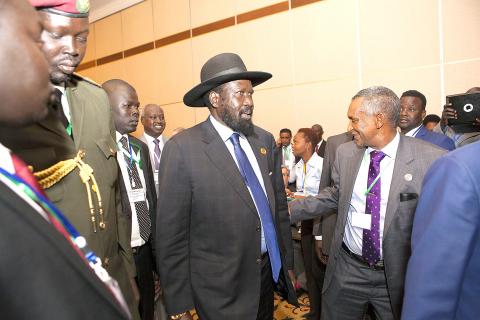African leaders were due to meet yesterday for their annual summit, with conflict topping the agenda, especially Nigeria’s Islamic insurgency group Boko Haram, as well as efforts to stem Ebola.
While the official theme of the African Union (AU) meeting is scheduled to be women’s empowerment, leaders from the 54-member bloc are once again beset by a string of crises across the continent.
Preparatory talks this week ahead of the two-day meeting at the AU headquarters in Addis Ababa have seen promises by AU Commission Chairperson Nkosazana Dlamini-Zuma to drum up “collective African efforts” to tackle Boko Haram.

Photo: AFP
On Thursday, the AU Peace and Security Council called for a regional five-nation force of 7,500 troops to be deployed to stop the “horrendous” rise of the extremist group.
More than 13,000 people have been killed and more than one million made homeless by Boko Haram violence since 2009.
Leaders are also expected to elect Zimbabwean President Robert Mugabe as AU chairman, replacing AU Chairman and Mauritanian President Mohamed Ould Abdel Aziz.
Mugabe, a former liberation war hero who at 90 is Africa’s oldest president and the third-longest-serving leader, is deeply respected by many on the continent.
However, he is also subject to travel bans from both the US and EU in protest at political violence and intimidation in Zimbabwe.
With over a dozen elections due to take place this year across Africa, the focus at the talks is to also be on how to ensure peaceful polls. African think tank the Institute for Security Studies said that “many of these are being held in a context that increases the risk of political violence.”
Wars in South Sudan and the Central African Republic — both nations scheduled to hold elections — as well as in Libya are also scheduled for debate.
South Sudan’s warring parties met on Thursday in the latest push for a lasting peace deal, with six previous ceasefire commitments never holding for more than a few days — and sometime just hours. Tens of thousands of people have been killed in South Sudan during more than a year of civil war.
Also topping the agenda is the question of financing regional forces, amid broader debates on funding the AU, a thorny issue for the bloc, once heavily bankrolled by late Libyan leader Muammar Qaddafi..
African leaders are also set to discuss the economic recovery of countries affected by Ebola, setting up a “solidarity fund” and planning a proposed African Center for Disease Control.
The worst outbreak of Ebola in history has seen nearly 9,000 deaths in a year — almost all of them in the three west African countries of Liberia, Guinea and Sierra Leone — and sparked a major health scare worldwide.

POLITICAL PRISONERS VS DEPORTEES: Venezuela’s prosecutor’s office slammed the call by El Salvador’s leader, accusing him of crimes against humanity Salvadoran President Nayib Bukele on Sunday proposed carrying out a prisoner swap with Venezuela, suggesting he would exchange Venezuelan deportees from the US his government has kept imprisoned for what he called “political prisoners” in Venezuela. In a post on X, directed at Venezuelan President Nicolas Maduro, Bukele listed off a number of family members of high-level opposition figures in Venezuela, journalists and activists detained during the South American government’s electoral crackdown last year. “The only reason they are imprisoned is for having opposed you and your electoral fraud,” he wrote to Maduro. “However, I want to propose a humanitarian agreement that

ECONOMIC WORRIES: The ruling PAP faces voters amid concerns that the city-state faces the possibility of a recession and job losses amid Washington’s tariffs Singapore yesterday finalized contestants for its general election on Saturday next week, with the ruling People’s Action Party (PAP) fielding 32 new candidates in the biggest refresh of the party that has ruled the city-state since independence in 1965. The move follows a pledge by Singaporean Prime Minister Lawrence Wong (黃循財), who took office last year and assumed the PAP leadership, to “bring in new blood, new ideas and new energy” to steer the country of 6 million people. His latest shake-up beats that of predecessors Lee Hsien Loong (李顯龍) and Goh Chok Tong (吳作棟), who replaced 24 and 11 politicians respectively

Young women standing idly around a park in Tokyo’s west suggest that a giant statue of Godzilla is not the only attraction for a record number of foreign tourists. Their faces lit by the cold glow of their phones, the women lining Okubo Park are evidence that sex tourism has developed as a dark flipside to the bustling Kabukicho nightlife district. Increasing numbers of foreign men are flocking to the area after seeing videos on social media. One of the women said that the area near Kabukicho, where Godzilla rumbles and belches smoke atop a cinema, has become a “real

‘WATER WARFARE’: A Pakistani official called India’s suspension of a 65-year-old treaty on the sharing of waters from the Indus River ‘a cowardly, illegal move’ Pakistan yesterday canceled visas for Indian nationals, closed its airspace for all Indian-owned or operated airlines, and suspended all trade with India, including to and from any third country. The retaliatory measures follow India’s decision to suspend visas for Pakistani nationals in the aftermath of a deadly attack by shooters in Kashmir that killed 26 people, mostly tourists. The rare attack on civilians shocked and outraged India and prompted calls for action against their country’s archenemy, Pakistan. New Delhi did not publicly produce evidence connecting the attack to its neighbor, but said it had “cross-border” links to Pakistan. Pakistan denied any connection to